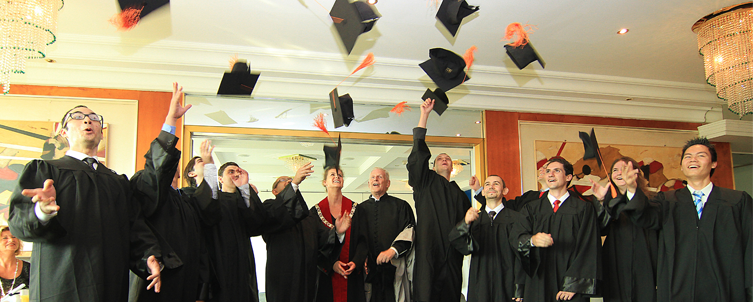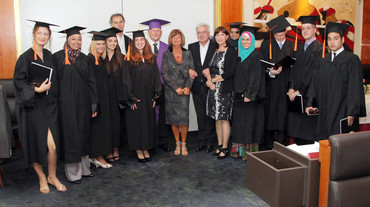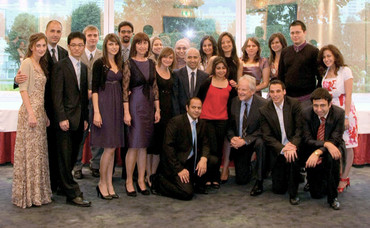

Apply today: 3000 € fellowship for excellent students
Admission deadline for fall: April 30.
We will award a limited number of waived tuitions and an additional 3000 € for excellent students.
The Program
Goal and Content of the Program
Universal Computing covers the breadth and depth of computing: From the deep foundation of computing in logic and mathematics to the numerous exciting and permanently evolving new applications in all areas of science, technology, industry, and society.
The Johannes Kepler University, a young (1967) campus-based university in the center of Europe, is the place where such an ambitious view can be implemented thoroughly: Over a hundred professors of mathematics, informatics and related areas excel in a wide range of research and teaching.
The program is organized by RISC (Research Institute for Symbolic Computation), an institute of the JKU with high international research reputation and a long tradition and experience in organizing both international study programs as well as cooperation programs with the industry. The founding chairman of RISC, Professor Bruno Buchberger, is also the mastermind and head of the “Universal Computing and Business” master’s program.
The international “Universal Computing and Business” master’s program is organized in a flexible way such that international students with a bachelor in mathematics or informatics (or related areas like information technology, business informatics, mechatronics etc.) can enter the program and obtain a Master of Science Degree according to the EU-norm.
The study and working language in this program is English.
Typically, we compose an individual study plan for each student depending on the past course work and the interests and future career goals of the applicant.
We motivate all students, in addition to pursuing their specialization area, to acquire a broad and deep understanding of computing (“Universal Computing”) including the business aspect of computing as the central and universal source of current and future industrial innovation. For this, we offer numerous possibilities to do the master thesis project in close cooperation with companies and research institutes, in particular also within the Softwarepark Hagenberg, a spin-off of RISC.
In principle, this master’s program comprises four semesters with minimum 140 ECTS points (which is slightly more than the EU standard, since we offer and request a couple of extra general courses like “Working Techniques for Scientists” and “Entrepreneurship Training”.
A bachelor degree (with 180 ECTS) in computer science, math or a related subject is the prerequisite for entering our master. Bachelor graduates who had fewer hard-core courses in computer science and math than 180 ECTS, might need to spend an extra semester in our master program.
Conversely, students who graduated from a bachelor or diploma study with more than 180 ECTS or who already earned extra ECTS after their bachelor at their previous university may be eligible to enter at the second or third semester of our master’s program.
The possible specialization areas in the frame of the Universal Computing and Business master’s program are numerous. They reflect the broad range of expertise of our faculty and adjust to the quickly evolving trends in computing, for example: machine learning, deep learning, artificial intelligence, automated reasoning, natural language processing, cognitive computing, natural language reasoning, heuristic algorithms, pervasive computing, internet of things, big data, cloud computing, web technology, mobile computing, knowledge management, data bases, business intelligence, software verification, testing, model based programming, software engineering, image processing, computer graphics, virtual reality, augmented reality, robotics, medical informatics, bio informatics, mathematical modeling, simulation, financial mathematics, industrial mathematics, educational software, computer algebra, numerical computation, symbolic computation, algorithm theory, formal methods, abstract state machines, complexity theory, mathematical logic, model checking, mathematical knowledge management, universal computing software systems, …
We offer a lively open community for our students in the “International Graduates Club” and provide individual coaching for all phases of the study including the application phase and the phase of transition to professional life and / or PhD study.
Due to the great success of the program in the past ten years (with over 150 graduates who now excel in their jobs at the industry or as PhD students), the number of study places will now be raised to max. 50 per year. Applications for study places and a limited number of scholarships are processed within the ranking on a first-come, first-served basis.





